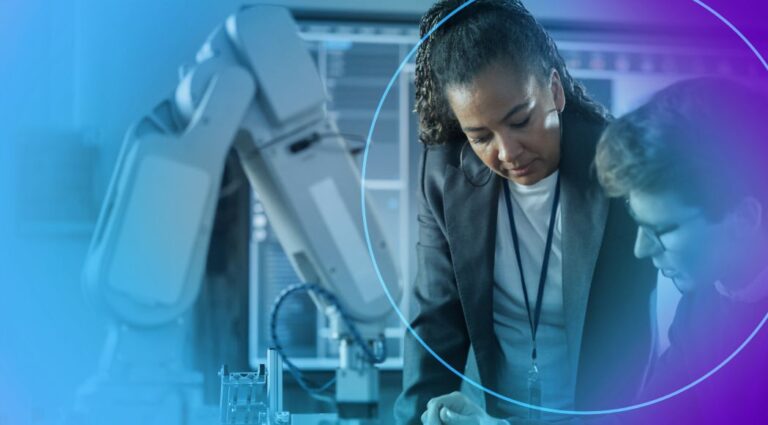The global engineering landscape is undergoing a profound transformation. Technologies like electric vehicles, robotics and artificial intelligence are not only reshaping industries but also redefining the core of engineering education. For educators, understanding these changes and preparing students to excel in this future is more critical than ever.
This post explores how cutting-edge technologies are driving change in engineering education. We will look at the unique challenges they present and the opportunities they create for educators and students to succeed in this evolving landscape.
The Key Challenges in Modern Engineering Education
Engineering education is experiencing a major shift as technology evolves at an unprecedented speed. Success now requires both strong theoretical knowledge and the ability to apply it to real-world problems. Academic institutions face several challenges as they adapt their engineering education programs to meet industry needs.
Balancing Theory with Hands-On Practice
One of the greatest challenges in engineering education is integrating academic foundations with practical experience. Programs must incorporate learning in areas like generative design, artificial intelligence and sustainable materials. This ensures students are not just learning theory but can also apply it effectively.
Shifting to a Problem-Solving Focus
Traditional textbook problems are becoming less relevant. The industry needs graduates who can tackle real-world projects. Modern engineering education must move toward curricula that foster critical thinking and innovation through hands-on, project-based learning.
Fostering Interdisciplinary Collaboration
Today’s engineering solutions demand collaboration across multiple disciplines. Whether in electric vehicles, autonomous systems or robotics, projects require a systems-thinking approach. Engineering education programs must break down silos and encourage teamwork between different engineering fields.
Cultivating Lifelong Learning
With industries advancing so rapidly, a degree is only the beginning. Graduates must be prepared to embrace continuous learning to remain relevant throughout their careers. A forward-thinking engineering education instills the mindset that learning never stops. By addressing these challenges, academic institutions can prepare graduates not only to enter the workforce but also to lead in shaping the future of engineering.
Virtual Twin Experiences: A New Frontier in Engineering Education
Virtual twin experiences, combined with industry-standard applications such as CATIA, SOLIDWORKS, SIMULIA and DELMIA, offer a “learning by doing” environment. They create realistic, hands-on learning environments that allow students to engage with the same technologies used by leading companies.
Traditional learning environments often struggle to connect theory with practice. Virtual twins—interactive digital replicas of real-world systems—are changing that. Unlike textbooks or standard simulations, virtual twins allow students to experiment, test designs and see the consequences of their decisions in a virtual setting. This immersive learning approach deepens understanding and fosters critical thinking. For future engineers, it’s not just about memorizing formulas—it’s about applying theory to solve real-world problems.
For educators, virtual twins offer new levels of flexibility. Whether the focus is on mechanical engineering, design or environmental management, this tool enables experiential teaching that equips students with industry-ready skills. This practical application is a vital component of a comprehensive engineering education.
How 3DEXPERIENCE Edu Transforms Engineering Education
Today’s engineers need more than theory; they need practical skills that align with industry expectations. 3DEXPERIENCE Edu partners with schools and industries worldwide to equip students and future engineers to thrive in a rapidly evolving landscape. Our goal is to prepare them to solve complex challenges and drive innovation.
Our approach focuses on:
- Collaboration and Trust: We partner closely with universities to align curricula with evolving industry needs, ensuring engineering education stays relevant.
- Curriculum Integration: We help embed industry-standard tools such as CATIA, SOLIDWORKS, SIMULIA and DELMIA directly into academic programs.
- Skills Focus: We ensure graduates gain practical, job-ready competencies that employers are looking for.
Education Experiences Approaches
To help educators manage tight curricula while still delivering depth and relevance, 3DEXPERIENCE Edu offers a comprehensive suite of solutions called “Education Experiences.” These leverage industry-standard software applications coupled with realistic virtual twins of real-world systems. They are designed to be flexible, offering different learning approaches to enhance engineering education.
Horizontal Learning
This approach offers a broad view of engineering projects that integrates multiple disciplines. It fosters teamwork, communication, and systems thinking—skills essential for modern engineers. It mirrors how complex projects are managed in the industry today.
Vertical Learning
This approach provides a focused dive into specific disciplines. It gives students the opportunity to strengthen technical expertise in targeted areas, allowing them to build deep knowledge in a chosen field.
Through these initiatives, 3DEXPERIENCE Edu empowers educators to deliver impactful programs. We equip students with the knowledge and skills essential for success in today’s demanding engineering landscape.
The Future of Engineering Education Is Here
By bridging the gap between academia and industry, educators are shaping the next generation of engineers. Through innovative teaching methods and cutting-edge technologies, we can transform engineering education from a theoretical exercise into a powerful engine for developing real-world skillsets. These future engineers will become the driving force behind the next wave of technological advancements.
